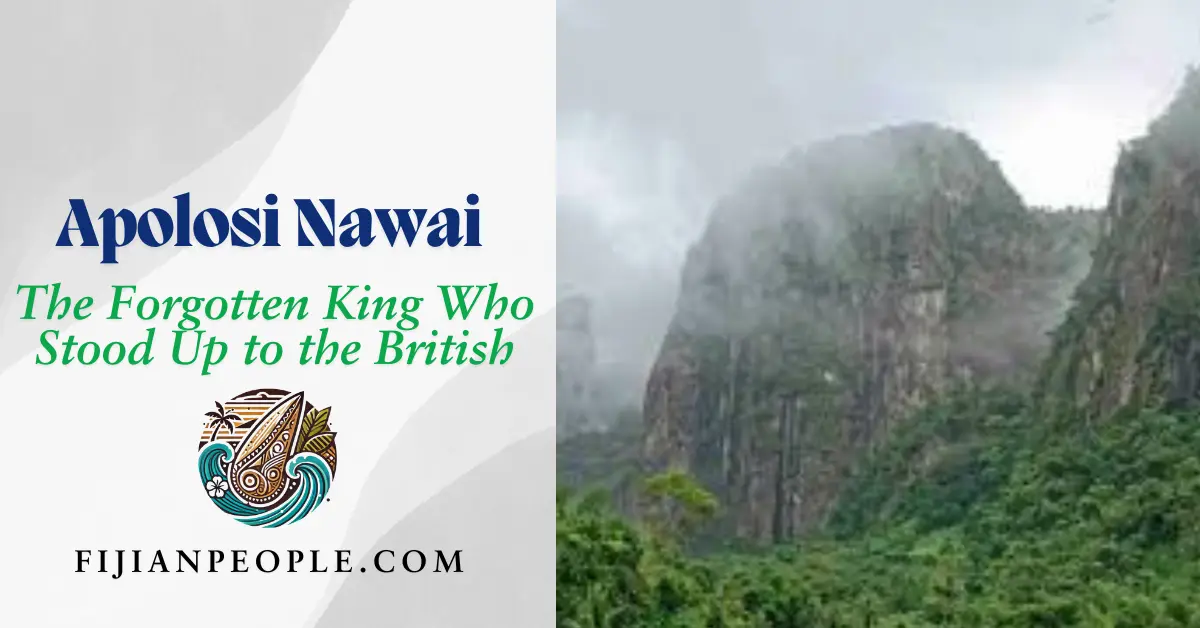Most of us know about the chiefs who signed the Deed of Cession, or the leaders who helped Fiji gain independence in 1970. But what about the ones who challenged the system before all that — and got erased from the story?
Let me introduce you to Apolosi Nawai — a man who wasn’t a chief, didn’t come from wealth, but still managed to rally thousands of people with a vision that scared the British government. He wasn’t just a leader. To many, he was the king Fiji never crowned.
Who Was Apolosi Nawai?
Born in the 1880s in the highlands of Namosi, Apolosi grew up during a time of serious change. Christianity was reshaping traditional culture, and British colonial rule had taken over how things were done. Land, laws, and leadership were no longer fully in the hands of the Fijian people.
But Apolosi had a different idea. He believed that Fijians could be economically independent, spiritually strong, and united as one people — without relying on colonial powers or foreign businesses.
The Viti Company: One Bold Vision
In 1911, he launched something called the Viti Kabani (Viti Company). It was like a grassroots business movement — encouraging Fijians to sell their produce directly, without going through European traders who often underpaid and overcharged.
He’d go from village to village, talking to people, preaching unity and hope. Some even say he mixed religion with business, saying God wanted Fijians to rise together and take charge of their own future.
One story I heard from an elder in Nadroga: “My grandfather gave bundles of dalo to the Viti Kabani because Apolosi Nawai said, ‘This is for us. Not for them.’ That stuck with me.”
Why the Government Got Nervous
Apolosi’s movement was peaceful — no guns, no violence. But that didn’t stop the colonial government from feeling threatened. Imagine this: a regular villager (not a chief!) inspiring thousands, raising money, and talking about a Fiji run by Fijians.
To the British, that was dangerous.
So in 1915, they threw him in prison. Ten years, just for “sedition.” But really, it was because he dared to wake people up.
A King Without a Throne
After his release, Apolosi Nawai kept going. He was more determined than ever, and even began calling himself Tui Viti — the King of Fiji. Some thought he was crazy. Others believed he truly was chosen.
To his followers, he wasn’t just a political figure — he was a prophet. He preached, he dreamed, he believed Fiji could stand tall on its own. No chiefs, no foreigners, just the people united.
The government, of course, didn’t like that. He was exiled, imprisoned again, and eventually silenced.
The End of His Journey — But Not His Impact
Apolosi Nawai died in 1946. No monument. No official recognition. Just silence.
But talk to the right people — especially elders in the villages — and you’ll still hear his name. Quietly spoken, almost like a secret. One retired schoolteacher once told me, “He believed in us when no one else did. And for that, we remember him.”
Why Don’t We Learn About Him?
He didn’t fit the neat story the history books like to tell. He wasn’t part of the government, didn’t work within the system, and wasn’t afraid to speak out. So, over time, his story faded — or was pushed aside.
But his message? Still relevant today.
Why Apolosi’s Story Matters Now
We still struggle with issues Apolosi Nawai raised: land ownership, cultural pride, economic freedom. He spoke about these things over 100 years ago. And he didn’t just talk — he acted.
He may not have been a king in the official sense, but in the hearts of many, he was a true leader — one who saw a future where Fijians were in charge of their own destiny.
And maybe, just maybe, it’s time we put his name back into the story. For more articles and stories like this visit fijianpeople.com!
Liked this post? Share it with someone who loves Fijian history — or drop a comment if you have family stories about Apolosi Nawai. Let’s keep his legacy alive. 🌺
